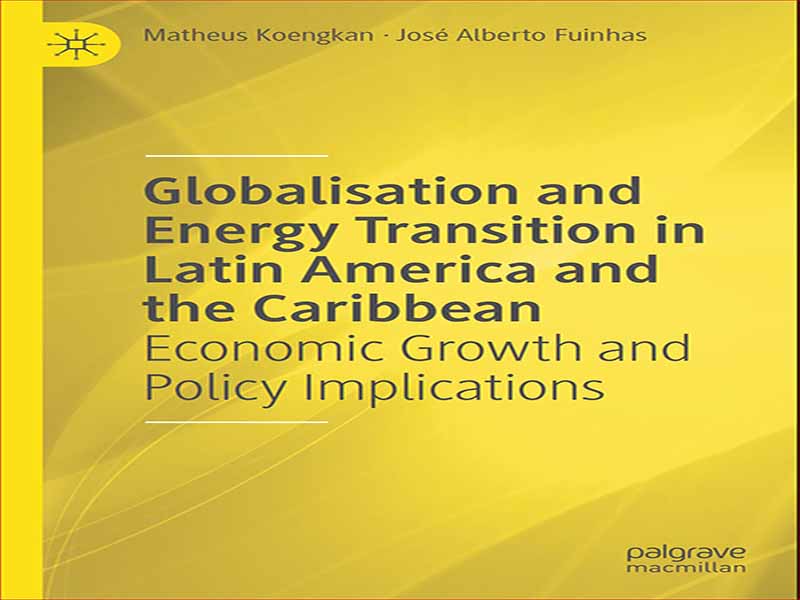- عنوان مجله: Globalisation and Energy Transition in Latin America and the Caribbean
- نویسنده: Matheus Koengkan
- حوزه: َانتقال انرژی
- سال انتشار: 2022
- تعداد صفحه: 264
- زبان اصلی: انگلیسی
- نوع فایل: pdf
- حجم فایل: 8.54 مگابایت
روند انتقال انرژی های تجدیدپذیر همان روند فرآیند جهانی شدن را دنبال کرد، جایی که طبق IEA (2018) ظرفیت نصب شده انرژی های تجدیدپذیر از زیست توده، نیروگاه آبی، خورشیدی، فتوولتائیک، باد، موج و زباله در یک میلیون کیلووات بود. 12935 (میلیون کیلووات) در سال 1989 و به ارزش 38648 (میلیون کیلووات) در سال 2014 رسید. در واقع، افزایش انرژی های تجدیدپذیر با کاهش انتشار دی اکسید کربن (CO2) از مصرف، تأثیر مثبتی بر محیط زیست دارد. سوخت های فسیلی که مسئول تخریب محیط زیست، گرمایش جهانی و تغییرات آب و هوایی هستند (Fuinhas et al., 2021; Koengkan et al., 2019d).
شواهدی مبنی بر اینکه انتقال انرژی های تجدیدپذیر همان روند جهانی شدن در منطقه آمریکای لاتین و دریای کارائیب (LAC) را دنبال می کند، همانطور که قبلاً ذکر شد، انگیزه بررسی سؤال اصلی این کتاب است: آیا فرآیند انرژی تجدیدپذیر انتقال می یابد. وضعیت در کشورهای LAC تحت تأثیر مثبت جهانی شدن قرار گرفته است؟ در ادبیات، تأثیر جهانی شدن بر انتقال انرژی های تجدیدپذیر ناشناخته باقی مانده است. کونگکان و همکاران (2019a) اشاره می کند که ادبیات کنونی بر درک تأثیر یا تأثیر جهانی شدن بر یک صنعت خاص یا سطح ملی متمرکز شده است و روشی را که در آن جهانی شدن بر پیشرفت انرژی های تجدیدپذیر تأثیر می گذارد کنار گذاشته است. ادبیات جهانی سازی شامل موضوعات فرعی مختلفی است: اقتصاد، انرژی، فرهنگ، روابط اجتماعی، سیاست، مهاجرت و فناوری (اورلند، 2016). با این حال، موضوع خاص انرژی های تجدیدپذیر در ادبیات جهانی سازی گم شده است (Koengkan et al., 2019a).
همچنین در ادبیات اقتصاد انرژی مطالعاتی در مورد این موضوع وجود ندارد، اگرچه نتیجه گیری در مورد ارتباط بین انرژی و جهانی شدن اخیرا نیست (Koengkan et al., 2019a). در واقع، سواکول (2014)، با کار مهم خود، وضعیت هنر مطالعات انرژی را بررسی کرد و تشخیص داد که شکافی در ادبیات در مورد رابطه بین جهانی شدن و انرژی های تجدیدپذیر وجود دارد. همانطور که توسط Overland (2016) ذکر شد، ادبیات موجود در مورد انرژی و جهانی شدن بسیار گسترده است. با این حال، مطالعات کمی در ادبیات وجود دارد که به طور خاص به جهانی شدن و انتقال انرژی های تجدیدپذیر نزدیک می شود.
The process of renewable energy transition followed the same trend as the globalisation process, where according to IEA (2018) the installed capac¬ity of renewable energy from biomass, hydropower, solar, photovoltaic, wind, wave, and waste in a million kilowatts was 12,935 (million kilo¬watts) in 1989 and reached a value of 38,648 (million kilowatts) in 2014. Indeed, the increase in renewable energy exerts a positive effect on the environment by reducing carbon dioxide emissions (CO2) from the con¬sumption of fossil fuels that are responsible for environmental degrada¬tion, global warming, and climate change (Fuinhas et al., 2021; Koengkan et al., 2019d).
The evidence that the renewable energy transition followed the same trend of the globalisation process in the Latin American and Caribbean (LAC) region, as mentioned before, motivated the investigation of the central question of this book: Is the process of the renewable energy tran¬sition in the LAC countries influenced positively by globalisation? In the literature, the effect of globalisation on renewable energy transition remains underexplored. Koengkan et al. (2019a) point out that the cur¬rent literature has focused on understanding the influence or effect of globalisation on a specific industry or national level and has left aside the way in which globalisation impacts progress in renewable energy. The glo¬balisation literature includes a diversity of sub-topics: economics, energy, culture, social relations, politics, migration, and technology (Overland, 2016). However, the specific topic of renewable energy is missing in the globalisation literature (Koengkan et al., 2019a).
There is also a lack of studies on this topic in the energy economics literature, although the conclusions about the link between energy and globalisation are not recent (Koengkan et al., 2019a). Indeed, Sovacool (2014), with their seminal work, investigated the state of the art of energy studies and recognised that there is a gap in the literature about the rela¬tionship between globalisation and renewable energy. As mentioned by Overland (2016), the existing literature about energy and globalisation is vast. However, few studies exist in the literature that specifically approach globalisation and renewable energy transition.
این کتاب را میتوانید از لینک زیر بصورت رایگان دانلود کنید:
Download: Globalisation and Energy Transition in Latin America and the Caribbean





































نظرات کاربران